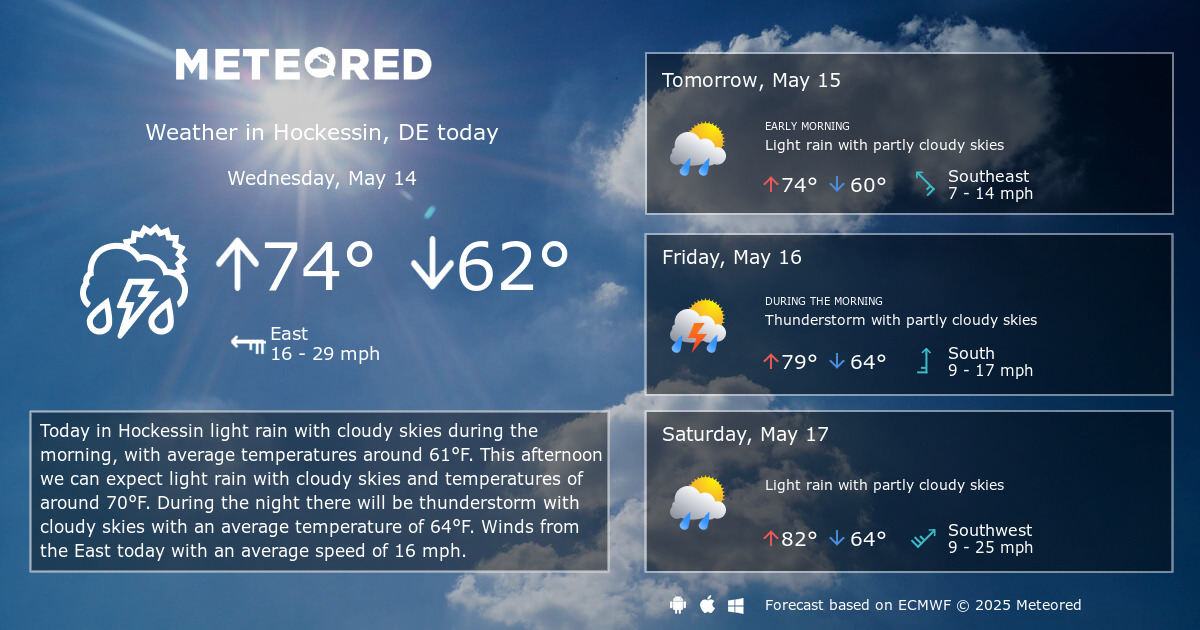Understanding Hockessin Weather: A Comprehensive Guide
Hockessin weather plays a crucial role in the daily lives of its residents and visitors alike. Whether you are planning a day out, engaging in outdoor activities, or simply commuting, knowing the weather conditions can help you make informed decisions. In this article, we will explore Hockessin's climate, seasonal variations, and the factors that influence its weather patterns.
Located in New Castle County, Delaware, Hockessin enjoys a temperate climate characterized by four distinct seasons. This guide will provide you with detailed insights into the weather patterns throughout the year, average temperatures, precipitation levels, and tips for coping with various weather conditions. Understanding these elements will enable you to plan better and enjoy everything Hockessin has to offer.
As we delve into the specifics of Hockessin weather, we will also highlight the importance of staying updated through reliable weather sources and services. This article aims to not only inform but also empower you to make the best choices based on the weather conditions in this charming community.
Table of Contents
1. Climate Overview
Hockessin experiences a humid subtropical climate, which means it has hot, humid summers and cold, snowy winters. The area enjoys a moderate amount of rainfall throughout the year, contributing to its lush greenery and beautiful landscapes. The average annual rainfall in Hockessin is approximately 42 inches, with the wettest months typically occurring in spring and summer.
The climate is influenced by its geographical location, with proximity to the Atlantic Ocean playing a significant role in moderating temperatures. Understanding the climate of Hockessin is essential for residents and visitors, as it affects everything from agriculture to recreational activities.
2. Seasonal Variations in Hockessin
2.1 Winter Weather
Winter in Hockessin usually lasts from December to February, with average temperatures ranging from 30°F to 45°F. Snowfall is common during this season, with January typically being the coldest month. Residents should prepare for icy conditions and occasional snowstorms, which can impact travel and outdoor activities.
2.2 Spring Weather
Spring, spanning from March to May, is characterized by mild temperatures and blooming flowers. Average temperatures range from 40°F to 70°F, making it a popular time for outdoor events and gardening. However, spring also brings rain, with April often seeing the highest precipitation levels.
2.3 Summer Weather
Summer in Hockessin, from June to August, can be hot and humid, with temperatures often exceeding 85°F. Thunderstorms are frequent during this season, providing relief from the heat but also causing temporary disruptions. It is essential to stay hydrated and protect yourself from the sun during these months.
2.4 Fall Weather
Fall, from September to November, offers cooler temperatures and stunning foliage. Average temperatures range from 50°F to 75°F, making it an ideal time for outdoor activities and festivals. Rainfall begins to increase again, particularly in November, as the region transitions to winter.
3. Temperature Statistics
Understanding temperature trends is vital for residents and visitors. Below are the average monthly temperatures in Hockessin:
| Month | Average High (°F) | Average Low (°F) |
|---|---|---|
| January | 40 | 24 |
| February | 42 | 26 |
| March | 50 | 33 |
| April | 60 | 42 |
| May | 70 | 52 |
| June | 80 | 62 |
| July | 85 | 66 |
| August | 83 | 64 |
| September | 75 | 55 |
| October | 65 | 45 |
| November | 55 | 38 |
| December | 45 | 28 |
4. Precipitation Patterns
Hockessin receives an average of 42 inches of precipitation annually, with rainfall distributed fairly evenly throughout the year. However, the spring months, particularly April and May, tend to see the highest levels of rainfall. Understanding these precipitation patterns can help residents plan for outdoor activities and gardening.
- Wettest months: April, May
- Driest months: February, August
- Snowfall: Average of 20 inches annually, primarily in January and February
5. Weather Resources and Updates
Staying informed about Hockessin weather is essential for making informed decisions. Here are some reliable resources for weather updates:
These platforms provide up-to-date forecasts, severe weather alerts, and valuable information to help you stay safe and prepared.
6. Tips for Coping with Hockessin Weather
Adapting to Hockessin's varying weather conditions is crucial for comfort and safety. Here are some tips to help you cope:
- Dress in layers during winter and fall to adjust to changing temperatures.
- Stay hydrated during the hot summer months and wear sunscreen when outdoors.
- Keep an umbrella handy during spring and fall to prepare for sudden showers.
- Check weather forecasts regularly to stay informed about severe weather alerts.
7. Conclusion
In conclusion, understanding Hockessin weather is vital for residents and visitors alike. By familiarizing yourself with the seasonal variations, temperature statistics, and precipitation patterns, you can plan your activities accordingly and enjoy all that this beautiful area has to offer. Remember to stay updated with reliable weather resources and follow the tips provided to cope with various weather conditions.
We invite you to share your thoughts in the comments below, share this article with others, or explore more articles on our site to stay informed about Hockessin and its weather.
Thank you for reading! We look forward to seeing you back on our site for more informative content.
Also Read
Article Recommendations



ncG1vNJzZmivp6x7tMHRr6CvmZynsrS71KuanqtemLyue9KtmKtlpJ64tbvKcWahp5OgsrS%2FyKdksJ2RqbWmvo2hq6ak
